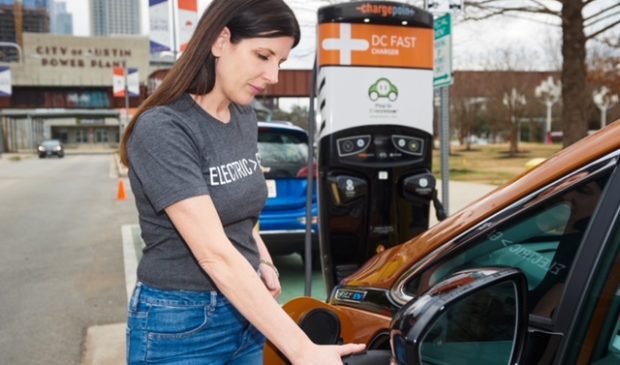Austin Energy tries to encourage Austinites to buy electric cars
Friday, January 18, 2019 by
Jack Craver Last week, the city of Austin was awarded a coveted $2.5 million grant from a foundation funded by former New York Mayor Michael Bloomberg to pursue a number of environmental initiatives focused on energy efficiency and green transportation.
While the Transportation Department will be using part of the grant to zero in on getting people out of their cars, Austin Energy is leading an effort to get the vast majority of Austinites who do drive to opt for electric vehicles.
At a Monday meeting of the Electric Utility Commission, Austin Energy staff and members of the commission discussed the challenge of getting drivers to go electric. One of the big problems: car dealerships.
“Salesmen don’t like to sell these things because they don’t make any money and the dealer doesn’t either,” explained Commissioner Michael Osborne, who is also chair of the board of the Texas Electric Transportation Resources Alliance, an advocacy group.
The problem, said Osborne, is that electric vehicles don’t require nearly as much maintenance and rarely need major repairs. Since dealerships make much of their money servicing the vehicles they’ve sold, they’re not as motivated to sell electric cars. Thus, dealers tend to offer their sales reps less generous commissions for electric vehicles.
There are roughly 6,800 electric vehicles in Austin. That puts the city above average, said Karl Popham, manager of electric vehicles and emerging technologies for Austin Energy.
The electric car market nevertheless remains decidedly niche, mostly occupied by those who are passionate enough about the technology to seek out an electric vehicle on their own. Rarely, however, does a consumer go to a car lot to browse and end up leaving with a new electric vehicle.
Popham said he has heard “horrendous” stories from people trying to buy electric cars. They often receive inaccurate information about the mileage that the cars can get per charge or the federal and state tax credits available for electric vehicle purchases.
Over the next two years, Popham’s team will reach out to dealerships to provide education on the vehicles in hopes of boosting electric vehicle sales.
“With the right educational tools and messaging in place, we commit to complete training and outreach to 100 percent of regional car dealerships that show strong demand for electric vehicles by December 2020,” said the work plan that the city submitted for the Bloomberg grant. “With assistance from the Climate Challenge and enhanced dealership education for electric vehicles, we think the Austin region will have over 10,000 electric vehicles on the road by 2020.”
This new effort supplements existing initiatives that Austin Energy has put in place to facilitate EV adoption. The utility already has more than 650 charging stations around its service area. Drivers get unlimited access for only $4.17 a month.
While many EV owners plug their cars into ordinary electric outlets in their garages, AE offers rebates that cover 50 percent of the cost of purchasing and installing a 240 volt charging station, which charges the cars faster. The maximum rebate for a normal station is $900, but the utility offers an even bigger rebate ($1,200) for Wi-Fi-connected stations.
The goal with connected charging stations, explained Debbie Kimberly, who is in charge of the utility’s energy efficiency programs, is to allow AE to reduce the charge during peak demand (usually between 4 and 6 p.m.). Thousands of AE customers are already enrolled in a similar program that allows the utility to adjust their thermostats to reduce energy consumption during peak demand.
The grant does not provide the city cash but rather $2.5 million “in a technical support package that may include things like a full-time adviser to work on the development and implementation of our projects, outreach support, data analysis and technical support, stakeholder engagement strategy and facilitation,” explained Amy Petri, a spokesperson for the city’s Office of Sustainability.
Photo courtesy of Austin Energy.
The Austin Monitor’s work is made possible by donations from the community. Though our reporting covers donors from time to time, we are careful to keep business and editorial efforts separate while maintaining transparency. A complete list of donors is available here, and our code of ethics is explained here.
You're a community leader
And we’re honored you look to us for serious, in-depth news. You know a strong community needs local and dedicated watchdog reporting. We’re here for you and that won’t change. Now will you take the powerful next step and support our nonprofit news organization?



